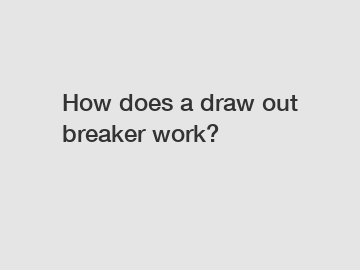How does a draw out breaker work?
In the realm of electrical power distribution, safety is paramount. One crucial element in ensuring safety is a draw out breaker. This ingenious device is designed to facilitate the removal and replacement of electrical circuit breakers quickly and efficiently. In this article, we will delve into the inner workings of a draw-out breaker, explaining its mechanism, benefits, and its significance in electrical systems.
1. The Basics: What is a Draw Out Breaker?
A draw-out breaker, also known as a removable circuit breaker, is a specialized circuit protection device used in electrical distribution systems. Unlike fixed or bolt-on breakers, draw-out breakers are installed on a rack or framework that allows them to be easily inserted or removed as needed. This unique design enables faster maintenance, troubleshooting, and breaker replacement.

2. Structure and Components:
A draw-out breaker consists of various components working together harmoniously. The primary elements include the circuit breaker itself, the rack or frame, and the operating mechanism. The breaker connects to the power system, while the rack houses the breaker and allows back-and-forth movement. The operating mechanism facilitates the insertion and extraction of the breaker.
3. How Does It Work?
When it comes to the operation of a draw-out breaker, the mechanism ensures a smooth transition from the 'closed' to 'open' position in response to electrical faults or manual intervention. Under normal circumstances, electrical power flows through the breaker, and the contacts remain closed. However, when a fault (e.g., short circuit or overload) occurs, the breaker's tripping mechanism is engaged, causing the contacts to separate, interrupting the current flow and protecting the system.
4. Key Advantages:
Draw-out breakers offer several remarkable advantages over fixed alternatives. Firstly, their removable nature allows for quick and efficient maintenance. Instead of shutting down the entire power system, only the faulty breaker needs to be replaced, leading to significant time and cost savings. Moreover, draw-out breakers are easily accessible, reducing downtime and minimizing disruption to critical operations.
5. Safety Considerations:
Safety is of utmost importance when dealing with electrical systems, and draw-out breakers play a crucial role in ensuring personnel safety. With these breakers, maintenance personnel can remove faulty breakers from a safe distance, protecting them from potential electrical hazards. Moreover, their design enables a visible isolation gap, clearly indicating the open position.
6. Applications of Draw Out Breakers:
Draw-out breakers find extensive usage in numerous industries, ranging from power generation plants to manufacturing facilities and large commercial buildings. Their versatility and ease of use make them an ideal choice for critical systems where downtime must be minimized, and safety is paramount.
7. Maintenance and Reliability:
To ensure optimum performance, draw-out breakers require regular maintenance and testing. Periodic inspections should be conducted to verify proper operation, cleanliness, and contact condition. Thorough cleaning and lubrication are essential, as contaminants can cause malfunction. Additionally, electrical tests, including insulation resistance and overcurrent protection, should be performed as part of preventive maintenance.
8. Choosing the Right Draw Out Breaker:
Selecting the appropriate draw-out breaker for a particular application can be a daunting task. Several factors should be considered, such as the current rating, breaking capacity, and compatibility with the existing electrical system. Consulting with experienced electrical professionals or manufacturers is highly recommended to ensure the right selection.
Conclusion:
Draw-out breakers have revolutionized the field of electrical distribution systems by providing a safe and efficient means of circuit protection. Their unique design and versatility enable quick maintenance and replacement, reducing downtime and minimizing risks. By understanding how draw-out breakers work and their benefits, electrical professionals and end-users can make informed decisions, ensuring the seamless and safe operation of their electrical systems.
Want more information on medium voltage disconnector for sale, outdoor rmu, gas insulated switchgear manufacturers? Feel free to contact us.

Comments
0